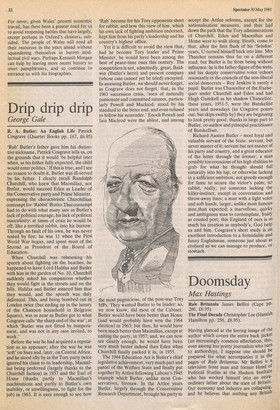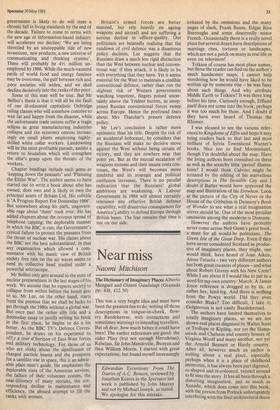Doomsday
Max Hastings
Rule Britannia James Bellini (Cape PP. 280, £6.95).
The Final Decade Christopher Lee (Hamish Hamilton pp. 256, £8.95).
Having glanced at the leering image of the author which covers the entire back jacket (an increasingly common affectation, this, even among less pretty journalists who turn to authorship), I suppose one should be prepared for what accompanies it in the pages of Rule Britannia. Mr Bellini 1 a television front man and former Head of Political Studies at the Hudson Institute who has worked himself into an extraordinary lather about the state of Britain. Our economy and industry are collapsing, and he believes that nothing any British government is likely to do will stem a chronic fall in living standards by the end of the decade. Failure to come to terms with the new age of information-based industry will accelerate our decline: 'We are being throttled by an unstoppable tide of new inventions, new products, a new universe of communicating and thinking systems'. There will probably be 41/2 million unemployed by 1986. While the much-vaunted perils of world food and energy famines may be overcome, the gulf between rich and poor societies will widen, and we shall decline decisively into the ranks of the poor.
Some of this may well be true. But Mr Bellini's thesis is that it will all be the fault of our ill-educated capitalistic Oxbridge ruling classes who will somehow contrive to wax fat and happy from the disaster, while the unfortunate trade unions suffer a tragic eclipse as great manufacturing industries collapse and the economy centres increasingly on small plants employing highlyskilled white collar workers. Landowning will be the most profitable pursuit, amidst a return to feudalism which will strengthen the elite's grasp upon the throats of the workers.
Chapter headings include such gems as 'keeping down the peasants' and 'Planning the Elitist War'. The author seems to have started out to write a book about who has owned, does own and is likely to own the principal assets of Britain Ltd. His subtitle is 'A Progress Report For Domesday 1986'. But somewhere along his path, ungovernable rage about 'them' took over. He has added chapters about the octopus spread of telephone tapping; the deplorable manner in which the BBC is run; the Government's cynical failure to protect the peasants from the threat of nuclear war. His claims about the BBC are the best substantiated, in that any organisation which allowed a commentator with his manic view of British society free rein on the air waves seems to need its collective head studied under a powerful microscope.
Mr Bellini only gets around to the state of nuclear preparedness in the last stages of his work. We assume that he expects society to collapse from within before the bomb gets to us. Mr Lee, on the other hand, starts from the premise that we shall be lucky to get through the 1980s without,a global war. But once past the rather silly title and a doomsday essay to justify writing his book in the first place, he begins to do a lot better. As the BBC TV's Defence Correspondent, he draws on his experience to off'..r a tour d'horizon of East-West forces and military technology. For those of us who are shaky about the significance of charged particle beams and the prospects for a satellite war in space, this is an admirable plain man's guide. He emphasises the deplorable state of the American services, the failure of their volunteer system, the near-illiteracy of many recruits, the corresponding decline in maintenance and efficiency, the absurd attempt to fill the ranks with women. Britain's armed forces are better manned, but rely heavily on ageing weapons and aircraft and are suffering a serious decline in officer-quality. Our politicians are belatedly realising that the rundown of civil defence was a disastrous policy decision. Lee suggests that the Russians draw a much less rigid distinction than the West between nuclear and conventional war: if they attack, it is likely to be with everything that they have. Yet it seems essential for the West to maintain a credible conventional defence, rather than run the slightest risk of Western governments watching impotent, fingers poised uncertainly above the Trident button, as unopposed Russian conventional forces sweep across Europe. Hence the profound fears about Mrs Thatcher's present defence policy.
Mr Lee's conclusion is rather more optimistic than his title. Despite the risk of an accidental holocaust, he considers that the Russians will make no decisive move against the West without being certain of victory, and they are nowhere near that point yet. But as the mutual escalation of weapons systems and their insane costs continues, the West's will becomes more doubtful and its strategic and political confusion increases. There is no parallel indication that the Russians' global ambitions are weakening. A Labour Government in 1984 will almost certainly renounce any effective British defence capability, with disastrous consequences for America's ability to defend Europe through British bases. The fear remains that time is not on our side.











































 Previous page
Previous page